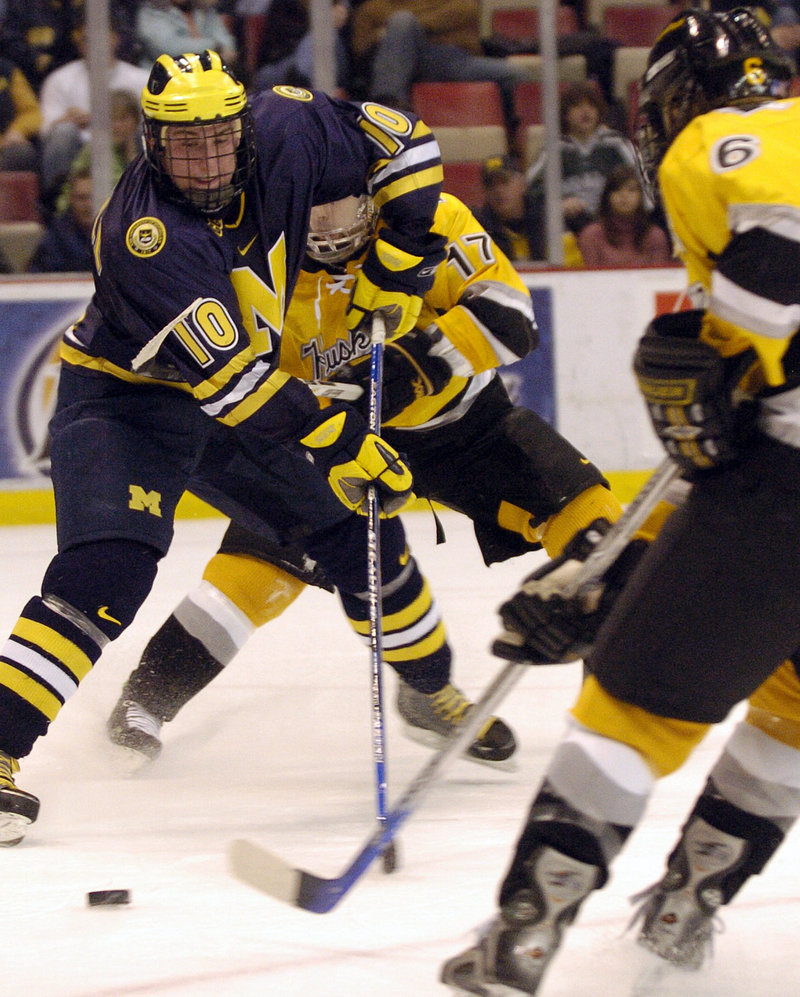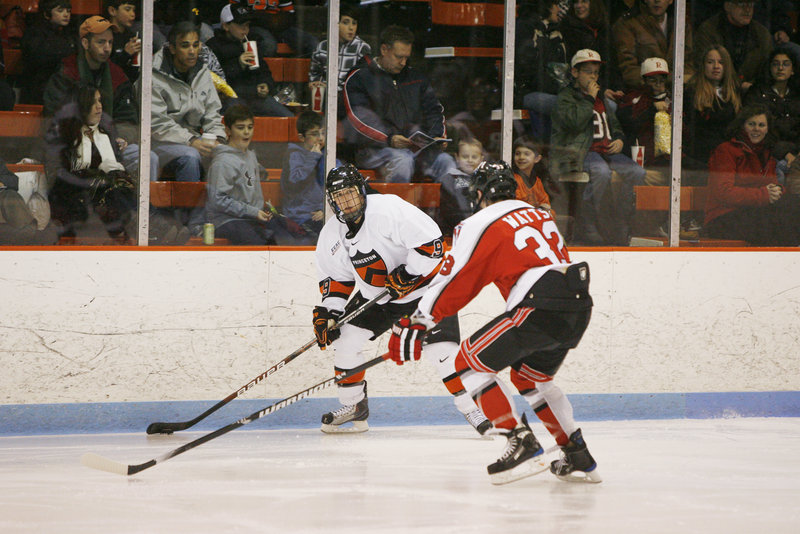Dan Bartlett didn’t actually say no to professional hockey, but he did say not yet.
Bartlett’s college hockey career at Princeton ended March 6 when Harvard eliminated the Tigers from the ECAC playoffs. In the days after his final game, several minor-league teams approached him and some of his teammates about opportunities to join professional teams, meaning he would leave school in the middle of the semester and continue course work while beginning a pro hockey career.
Bartlett, a resident of Portland and graduate of North Yarmouth Academy, didn’t want that life right away.
He had the opportunity to join an ECHL team but opted to stay at Princeton to finish his thesis — a requirement to earn his degree in molecular biology.
“I have lab-based work to do for my thesis,” Bartlett said. “I couldn’t go away for any extended period of time because I had to focus on lab work, and I didn’t think it would be worth missing that much time. I spend about 15 hours a week in the lab, and it’s not time-consuming but I really need to be here.”
As logical as his decision may seem, Bartlett’s situation is unusual in the context of college hockey. Players often leave school to join a pro team immediately after the college season ends, typically in the middle of March or early April, while classes don’t end until late April or early May. Some have their rights held by NHL teams; others sign free-agent contracts or amateur-tryout contracts with minor-league or NHL teams.
University of Maine forward David deKastrozza signed with the South Carolina Stingrays of the ECHL, and Black Bears goalie Dave Wilson signed an amateur tryout agreement with the AHL’s Manchester Monarchs.
Among the 10 Hockey East schools, at least 20 players have signed pro contracts since the conclusion of the regular season.
Phil DeCarlo, the director of student-athlete support services at Boston University, said each year brings a different number of players who turn pro. BU already has lost four players to the pros — Kevin Shattenkirk, Colby Cohen, Eric Gryba and Nick Bonino — and while DeCarlo can’t speak about each player’s academic circumstances because of federal privacy rules that prohibit discussion of a student’s academic progress, he explains that it’s an individual player’s decision to continue course work.
“Some are gung-ho about finishing their degree,” said DeCarlo, who oversees academic support for four sports at BU, including men’s hockey. “The likelihood of them finishing their degree increases dramatically depending on how long they stay in school before turning pro.”
BALANCING ACT
Matt Generous had two classes left towards a macroeconomics degree from St. Lawrence University when he turned pro with the Portland Pirates last spring. He roomed with teammate Travis Turnbull, who had four courses remaining toward a degree in general studies from the University of Michigan.
“The biggest challenge is trying to stay focused,” Generous said. “It’s hard to motivate yourself away from the rink. Some days the last thing you want to do is schoolwork.”
Living in South Carolina, deKastrozza devotes his mornings to hockey and his afternoons to completing his course work before final exams at Maine, which begin May 3. His roommate, Johann Kroll, is in his second year of pro hockey and is working toward becoming a chartered financial analyst after playing college hockey at Ohio State.
“It has a lot to do with time management,” deKastrozza said. “You have to be up at 8:30, be at the rink an hour before practice and there’s no sitting around or meetings. You go right into practice. Then in the afternoon, it’s all schoolwork.”
TECHNOLOGY
Twenty years ago, if a player chose to leave school to pursue a pro career, there was no way to continue class work during the semester. Instead, a player would have to return to school during the summer.
Enter the Internet, e-mail, Web tutorials, video conferencing and other technological advances that allow a hockey player on the road to stay connected with his school. But the connection can be tenuous.
Advances in technology, as well as an educational initiative at the pro level that allows players to continue their course work, have allowed players to work toward a college degree.
“The older I got, the NHL (Players Association) started working on programs for guys to complete their education,” said Pirates assistant coach Eric Weinrich, who left Maine after 21/2 years to join the U.S. national team before turning pro in 1988. “When the offseason comes, the last thing you want to do is work on schoolwork. Now that they have the opportunity to go pro, they can peck away at a class or two every year.”
PLANNING IT OUT
Crissy Kerluke is an academic athletic counselor at Maine and is in the midst of planning out next year’s academic schedule with the men’s hockey team.
If a player anticipates turning pro at the end of his senior season, she and that player will plan a long-term academic schedule in advance.
They will consult with professors and take into consideration summer courses and online courses and create a more flexible spring semester schedule.
During his three-week stint in Portland last spring, Turnbull finished three classes online but had to return to Ann Arbor after the Pirates were eliminated from the AHL playoffs.
Turnbull took an incomplete grade in a statistics class and had to retake the class during Michigan’s spring term.
“You miss one thing in that class and it builds and builds and builds, and that’s a class where you need to know your material,” Turnbull said.
“It was a tough time to come here. (Professors) never really know what you have to go through. You’ve just signed, you have to make an impression (with the team), but you also have to get your degree at the same time.”
Bartlett, who stayed at Princeton, will receive his degree in June. Then he’ll consider professional hockey opportunities after the school year.
“In the long run, I don’t think not playing 10 games would have made much of a difference,” Bartlett said. “It’s definitely more important to finish my classes and my thesis.
“It’s what I came to Princeton to do, to earn my degree.”
Staff Writer Rachel Lenzi can be reached at 791-6415 or at: rlenzi@pressherald.com
Copy the Story Link
Send questions/comments to the editors.




Success. Please wait for the page to reload. If the page does not reload within 5 seconds, please refresh the page.
Enter your email and password to access comments.
Hi, to comment on stories you must . This profile is in addition to your subscription and website login.
Already have a commenting profile? .
Invalid username/password.
Please check your email to confirm and complete your registration.
Only subscribers are eligible to post comments. Please subscribe or login first for digital access. Here’s why.
Use the form below to reset your password. When you've submitted your account email, we will send an email with a reset code.